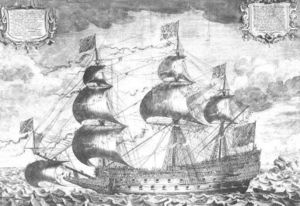HMS Royal Sovereign (1637)

'The true portrait of His Majesty's royal ship the Sovereign of the Seas', a contemporaneous engraving by J. Payne
|
|
| History | |
|---|---|
|
|
|
| Name: | Sovereign of the Seas |
| Builder: | Peter Pett, Woolwich Dockyard |
| Launched: | 13 October 1637 |
| Renamed: |
|
| Fate: | Burnt, 1697 |
| Notes: |
|
| General characteristics as built | |
| Class and type: | 90-gun first-rate ship of the line |
| Tons burthen: | 1522 |
| Length: | 127 ft (39 m) (keel) |
| Beam: | 46 ft 6 in (14.17 m) |
| Depth of hold: | 19 ft 4 in (5.89 m) |
| Propulsion: | Sails |
| Sail plan: | Full rigged ship |
| Armament: |
|
| General characteristics after 1660 rebuild | |
| Class and type: | 100-gun first-rate ship of the line |
| Tons burthen: | 1605 |
| Length: | 127 ft (39 m) (keel) |
| Beam: | 47 ft 6 in (14.48 m) |
| Depth of hold: | 19 ft 2 in (5.84 m) |
| Propulsion: | Sails |
| Sail plan: | Full rigged ship |
| Armament: | 100 guns of various weights of shot |
| General characteristics after 1685 rebuild | |
| Class and type: | 100-gun first-rate ship of the line |
| Tons burthen: | 1683 tons |
| Length: | 167 ft 9 in (51.13 m) (gundeck) |
| Beam: | 48 ft 4 in (14.73 m) |
| Depth of hold: | 19 ft 4 in (5.89 m) |
| Propulsion: | Sails |
| Sail plan: | Full rigged ship |
| Armament: | 100 guns of various weights of shot |
Sovereign of the Seas was a 17th-century warship of the English Navy. She was ordered as a 90-gun first-rate ship of the line of the English Royal Navy, but at launch was armed with 102 bronze guns at the insistence of the king. She was later renamed Sovereign, and then Royal Sovereign. The ship was launched on 13 October 1637 and served from 1638 until 1697, when a fire burned the ship to the waterline at Chatham.
Sovereign of the Seas was ordered in August 1634 on the personal initiative of Charles I of England, who desired a giant Great Ship to be built. The decision provoked much opposition from the Brethren of Trinity House, who pointed out that "There is no port in the Kingdome that can harbour this shipp. The wild sea must bee her port, her anchors and cables her safety; if either fayle, the shipp must perish, the King lose his jewel, four or five hundred man must die, and perhaps some great and noble peer". But the King overcame the objections with the help of John Pennington and from May 1635 she was built by Peter Pett (later a Commissioner of the Navy), under the guidance of his father Phineas, the king's master shipwright, and was launched at Woolwich Dockyard on 13 October 1637. As the second three-decked first-rate (the first three-decker being the Prince Royal of 1610), she was the predecessor of Nelson's Victory, although the Revenge, built in 1577 by Mathew Baker, was the inspiration for her, providing the innovation of a single deck devoted entirely to broadside guns.
...
Wikipedia
